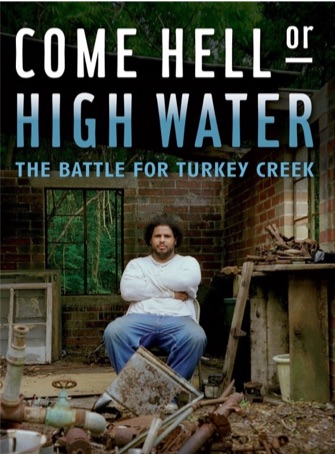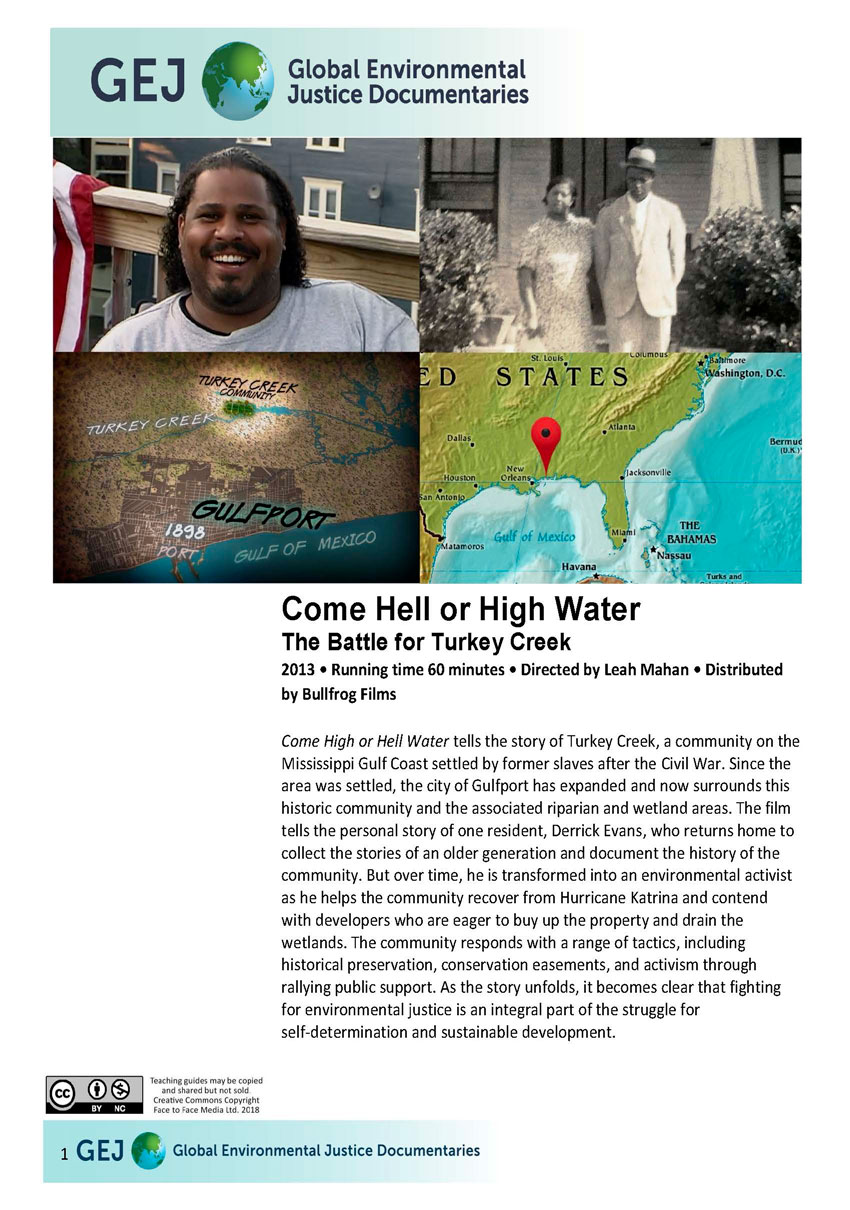Curator
 — Amity Doolittle, Senior Lecturer and Research Scientist, Yale School of Forestry and Environmental Studies
— Amity Doolittle, Senior Lecturer and Research Scientist, Yale School of Forestry and Environmental Studies
Come Hell or High Water
The journey of Derrick Evans, a Boston teacher who moves home to coastal Mississippi when the graves of his ancestors are bulldozed to make way for the sprawling city of Gulfport.

Curator and writers
This documentary was selected by Amity Doolittle, senior lecturer and research scientist at the Yale School of Forestry and Environmental Studies and written by Caroline Scanlan, Liz Felker and Elham Shabahat, graduate students at the Yale School of Forestry and Environmental Studies.
Why we selected this film
The importance of Come High or Hell Water lives in its ability to draw connections between civil rights and responsible urban development, environmental conservation, and environmental disaster relief and recovery. The film highlights the personal experiences of local grassroots activists, including their respective strategies for working toward justice in the Turkey Creek community.
Teacher's guide
Please see the teacher's guide for maps, background information and suggested subjects, questions and activities.
Synopsis
Come Hell or High Water traces the painful, inspiring journey of Derrick Evans, a Boston teacher who moves home to the Mississippi Gulf Coast community of Turkey Creek, first settled by former slaves, when the graves of his ancestors are bulldozed to make way for the sprawling city of Gulfport. Over the course of a decade, Evans and his neighbors stand up to powerful corporate interests and politicians and face ordeals that include Hurricane Katrina and the BP oil disaster in their struggle for self-determination and environmental justice. They build powerful alliances to fight urban sprawl and industrial contamination —to protect the culture and natural environment that sustained eight generations.
The environmental justice focus of the film
Set in an African-American community on the Mississippi Gulf Coast, Come Hell or High Water (CHHW) explores the connections between civil rights and environmental justice. The film provides a platform for investigating issues corresponding to three types of justice: distributive justice, recognition justice, and procedural justice.
-
The matter of distributive justice is raised in the resident's attempts to reverse the unequal distribution of environmental burdens on the African-American residents of Turkey Creek. These burdens include the loss of land and culturally significant sites, environmental degradation, and increased flooding.
-
Recognition justice is present in the residents' efforts to have Turkey Creek acknowledged as: a historically significant community deserving of federal recognition; an environmental resource deserving of conservation; and a community deserving of adequate FEMA Katrina relief and recovery resources.
-
The film also highlights procedural justice through efforts to improve and increase participation in a wide range of public decision-making processes affecting the Turkey Creek community.
REVIEWS
“This intimate film tells a gigantic story … It’s about everything that matters in our society.” – Bill Bigelow, Rethinking Schools
“A powerful film for all those interested in social and environmental justice.” – Stephen L. Hupp, Library Journal
“We highly recommend this documentary film about a middle school teacher who leads an environmental justice battle in a historic African American community in Mississippi.” – Deborah Menkart, Teaching for Change
“Viewers will be touched by Evans’ courage and self-sacrifice and gain insight into the region’s historical, environmental, and racial issues.” – Candance Smith, Booklist
“Exposes raw in-your-face Mississippi politics … a perfect lesson that we are not living in a post-racial era.” – Dr. Robert Bullard, Dean, School of Public Affairs, Texas Southern University
“A powerful story of one man’s good fight.” – C. Cassady, Video Librarian
Come Hell or HIgh Water: the Battle for Turkey Creek
Review by J. Zimmerman for Video Librarian
7 April 2023 Five Stars *****
Come Hell or High Water is an outstanding case study on environmental racism and the struggles communities face in seeking environmental justice. Any college-level instructor should consider this film for classroom use.
Come Hell or High Water is a personal documentary of epic proportions. Filmmaker Leah Mahan began documenting the family history of her friend, Derrick Evans, after they graduated from college together in Boston. We see Turkey Creek, Mississippi, in 2001 as Derrick gathers elders from the community to tell and preserve their stories. What began as a personal project between friends becomes the tale of an endangered community as the years roll on.
Derrick leaves Boston on sabbatical, moving to Turkey Creek as it faces the expansion of an airport and commercial development. Environmental organizations become involved as Turkey Creek is not only a historically black community founded by former slaves but protected wetlands and endangered bird habitats. 2005 Brings the dual threat of hurricanes Katrina and Rita, which nearly bring an end to the hopes of preserving Turkey Creek. The documentary ends sometime in 2010, returning its focus to Derrick as he faces a decision: he cannot live two lives. He must choose between Turkey Creek and Boston.
Gentrification, environmental racism, government inaction, and societal apathy unwind over a decade of footage in Come Hell or High Water. Leah Mahan shows herself as an expert in the documentary format, packing this 56-minute film with what most directors would give you in three hours. Her interjections and exposition are always thoughtful and welcome beside Derrick’s thoughts and experiences, but Derrick is the driving force behind this documentary. We follow him between his chosen home in Boston and his birth home of Turkey Creek as he and his community fight against the local, state, and federal governments which favor investor dollars over environmental protection and endangered history.
We see horrors typically depicted in documentaries about indigenous people living in rural areas happen just outside one of Mississippi’s largest cities: Graves are desecrated to put in apartment complexes, and runoff bubbles into EPA-protected Turkey Creek, all the while, elected officials and administrators turn blind eyes to the issue, courting development money. This documentary is a must-see for anyone interested in environmental justice, black history, or stellar documentary filmmaking. Highly Recommended. Editor’s Choice.
Where does this title belong on public library shelves?
Come Hell or High Water belongs primarily on environmental documentary shelves, but would also fit in biography, American ethnography, and black history collections.
What type of film series could this documentary fit in?
Come Hell or High Water belongs in any documentary series about environmental racism and ecological justice.
What instructors could use this film?
Any college-level instructor should consider this film for classroom use. High school, undergrad, and graduate-level ecology courses, public policy and management, and black history instructors will find the greatest value in Come Hell or High Water.
How does this film contribute to a discussion of environmental or climate justice, and/or to environmental literacy?
Come Hell or High Water is an outstanding case study on environmental racism and the struggles communities face in seeking environmental justice.
Awards
2014 Official Selection, Environmental Film Festival in the Nation’s Capital 2014 Official Selection, San Francisco Green Film Festival Winner, 2013 Audience Award, Documentary Feature, New Orleans Film Festival
Citation
Main credits
Evans, Derrick (participant)
Mahan, Leah (film director)
Mahan, Leah (film producer)
Mahan, Leah (cinematographer)
Greenberg, Jane (film producer)
Greenberg, Jane (film editor)
Other credits
Co-editors, William A. Anderson and Dawn Logsdon; composer, Derrick Hodge.
Distributor credits
Leah Mahan and Jane Greenberg
Leah Mahan
Producer, Director, Cinematographer – Leah Mahan
Producer and Editor – Jane Greenberg
Co-Editors – William A. Anderson, Dawn Logsdon
Composer – Derrick Hodge
Additional Editing – Sari Gilman, Ken Schneider
Docuseek subjects
History
Anthropology and Archaeology
Politics and Political Science
North American Studies
Water
Americas, The
African-American Studies
Government Policy
Citizenship, Social Movements and Activism
Human Rights
Global / International Studies
Geography
United States
Environmental Geography
Distributor subjects
African American Studies
Cultural Anthropology
Democracy
Environmental Justice
History
North American Studies
Oceans and Coasts
Race and Racism
Rivers
Sociology
Sustainability
United States
Water
Wetlands
Keywords
Welcome to Docuseek2!
Docuseek2 is a streaming platform of the best documentary and social issue films available for the higher education community.
Anyone may search for titles and find detailed information about the titles. To preview films or license them for streaming, you must register and login.
Currently, we support online registration for anyone affiliated with a higher education institution. Please inquire if you are with a K-12 district or school or with a public library.
Click the Close button to get started!


